The Elite's Inertia: Why Change Evades Lebanon's "Stupid Normal People"
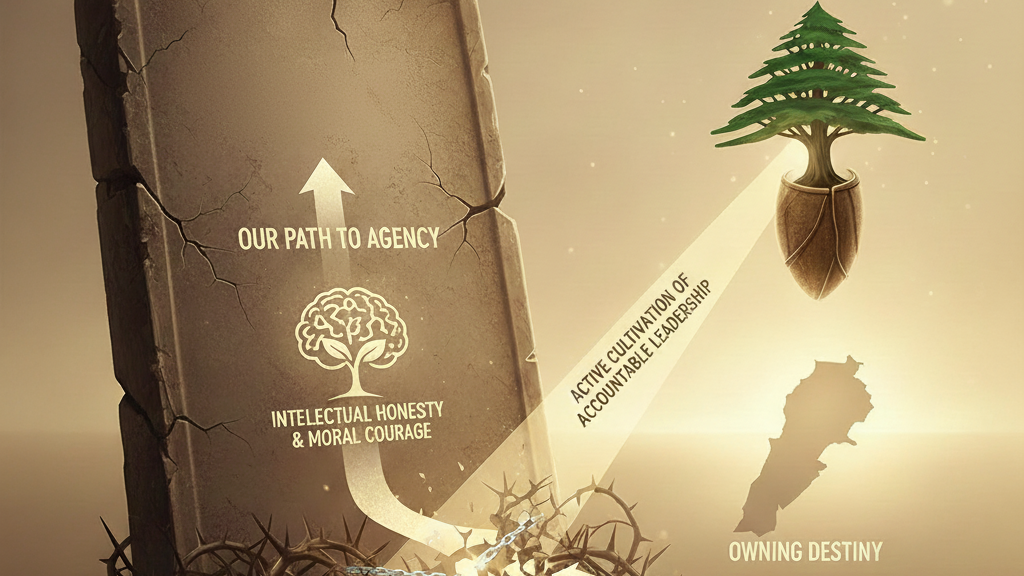
Lebanon's Deepest Question: "Why Don't Things Ever Change?"
Walk around Lebanon today, and you can practically hear the question echoing everywhere: "Why does nothing ever change?" Despite incredible courage from protesters and reformers, our country is stuck. We're facing a massive, self-made crisis hitting us from every angle.
Our economy? It's in shambles. The Lebanese pound has lost a shocking 99% of its value against the US dollar. This has pushed more than half our population into poverty. The World Bank even called Lebanon's collapse one of the worst economic crises in modern history. This isn't just about a few bad politicians; it's a deep, systemic problem. We need fundamental, institutional change.
The Elite's Grip: Trapped in the Status Quo 🤝
A huge roadblock to any real change is what we call "elite capture." Imagine a small, powerful group that controls public resources. But instead of using them for everyone's good, they funnel them right into their own pockets. They love their "extractive" position – they're getting rich at our expense – and they'll fight hard to keep it.
These elites resist any change unless it specifically benefits them. They'd rather play political games and maintain their power than make the tough decisions needed to help the country. This is exactly why we're stuck.
Lebanon's political leaders have consistently avoided real reforms that might threaten their interests. They prefer quick fixes that just make inequality worse. Think about it:
- Banks allegedly used media to protect their own interests.
- The 2024 budget reportedly made the rich pay less tax while hitting lower-income families harder.
There are even claims these elites actively sabotage international negotiations, like those with the IMF. Why? Because the reforms required would directly threaten their comfortable positions. For them, the chaos we know is better than the uncertainty of change. It's all about holding onto power, even if everyone else suffers.
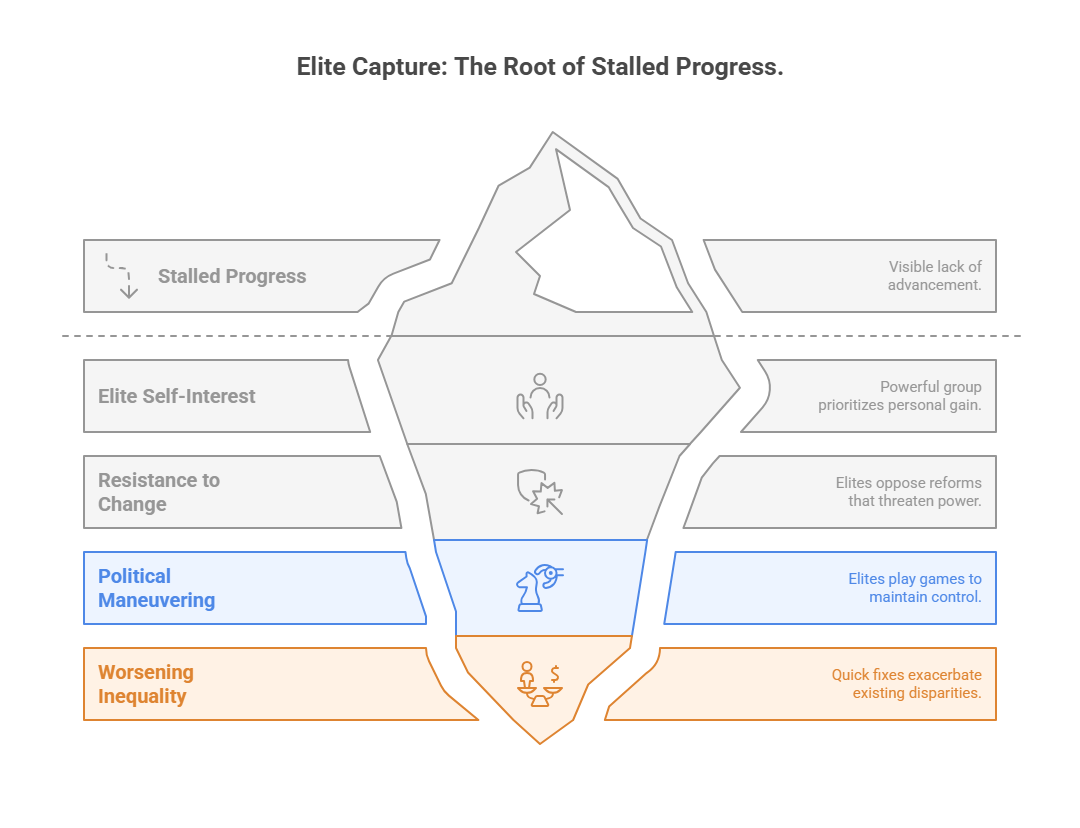
The Citizen's Dilemma: Why Are We So Helpless? 🤷♀️
As citizens, we have ways to show we're unhappy. We can "exit" – by not voting, or even by leaving the country. Or we can use our "voice" – protesting, rallying, and demanding change. But actually making that change happen is incredibly difficult.
One big reason is "learned helplessness." When you keep trying to fix things and repeatedly fail, you start to feel like you have no control. This leads to disinterest, distrust in politicians, and a lack of confidence in the system. It's a powerful way to keep people from acting.
Then there's political ignorance. Sometimes we don't have enough information. Or we might decide it's "rationally ignorant" to spend time understanding complex political issues because our individual effort seems too small to matter.
And the "collective action problem" is real. It's tough to get a huge number of people to work together for a common cause, because everyone hopes someone else will do the heavy lifting. Add to this our constant political instability and changing governments, and you can see why consistent reform is a pipe dream. We need to overcome this "tyranny of laziness" and find ways to get actively involved.
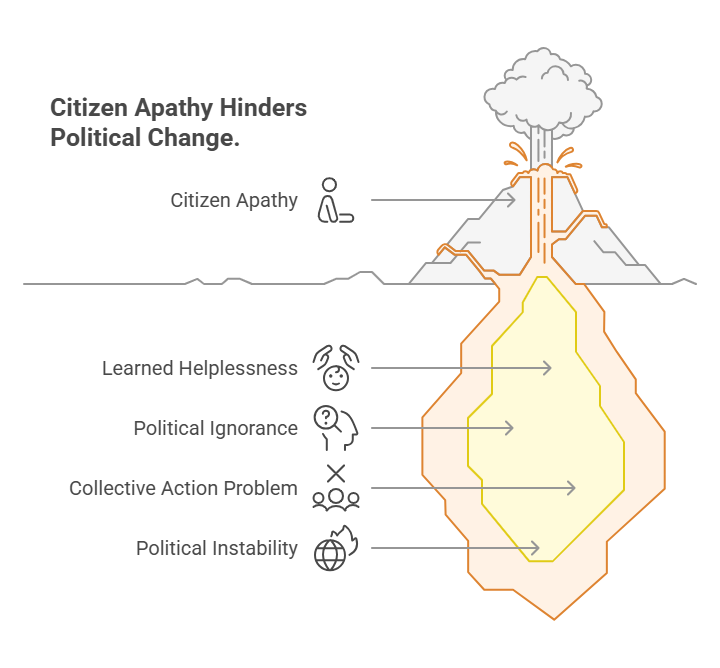
The Crucial Role: We Need Capable Leaders ✨
Many thinkers, from philosophers to sociologists, emphasize how vital it is to have competent, visionary, and public-service-oriented leaders to guide society. This isn't about wanting a dictator, but about needing effective leadership.
Even Machiavelli, famous for his tough advice on power, said that creating a new order is "nothing more difficult to plan, more doubtful of success, nor more dangerous to manage." While he focused on gaining power, his ideas still show that leaders need to maintain a positive public image, even if they have to do "dirty work" behind the scenes. Today, good leadership means adapting to our laws and society, not resorting to violence.
On the other hand, "transformational leadership" is all about leaders who are adaptable and truly understand their followers' evolving needs. These leaders:
- Articulate a compelling vision.
- Inspire trust and motivate extraordinary results.
- Prioritize participatory leadership.
- Value the growth, morals, and values of their followers.
- Are highly self-aware of their impact.
Strong leadership is essential for raising awareness, organizing people, and overcoming those collective action problems. Sometimes, charismatic leaders emerge during crises, inspiring and influencing success.
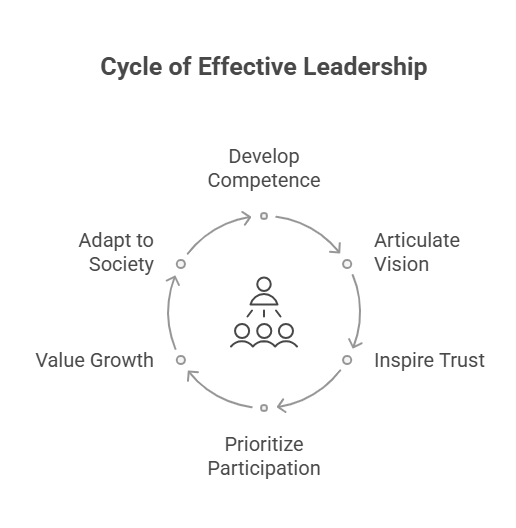
A New Reality: Pathways to Cultivating Change 🌱
So, what's the solution? It's not authoritarian rule or some unelected "benevolent" group. What Lebanon truly needs is a new elite that is:
- Intellectually Honest: Willing to face harsh realities and learn from the best globally.
- Nationally Focused: Prioritizing Lebanon's collective future, not just sectarian or personal gain.
- Accountable & Transparent: Operating openly, under public and legal scrutiny. Transparency, especially with public money, is vital for rebuilding trust.
- Courageous: Ready to make difficult, unpopular decisions that challenge the old ways. This is a huge test for modern leaders.
- Tech-Savvy & Forward-Looking: Understanding modern value creation and effective governance.
- Morally Grounded: Acting with integrity and a genuine desire to serve the public.
How can this new elite emerge?
- Through sustained intellectual discourse and sharp analysis.
- The rise of civil society movements that build strong internal strategies. These groups are vital for demanding accountability, driving reform, supporting local changemakers, advocating for rights, and exposing corruption. They can even create early warning systems for democratic backsliding.
- Fostering meritocracy and competence in overlooked sectors.
- International pressure that genuinely supports reform, instead of propping up the current, failing system. International cooperation is essential for tackling systemic issues like kleptocracy.
Ultimately, if our elites change their ways and we develop a truly national vision, "normal people" will feel empowered to act together, demand accountability, and break free from fatalism and clientelism. This also means recognizing and addressing intergenerational trauma – the wounds passed down through generations – and weaving healing into our social change efforts. We can even learn from history: crises can be powerful opportunities for reform, sparking commitment and collaboration. Problem-driven iterative adaptation—starting with local problems and trying out solutions—offers a flexible way forward. And finally, educating the public about our collective journey is key to national development.
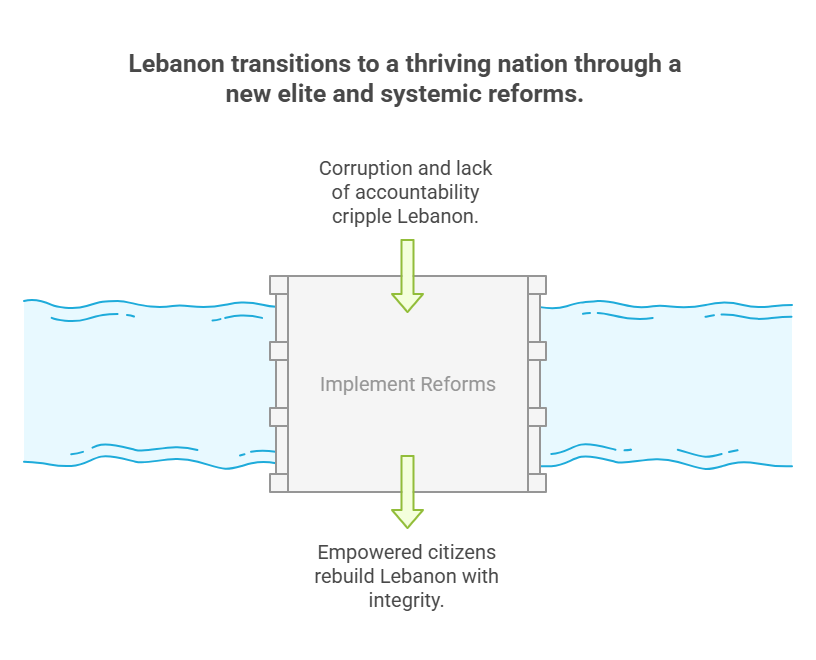
The Hard Truth & Our Path to Agency 🚀
The uncomfortable truth for Lebanon is clear: genuine, systemic change is profoundly unlikely without a fundamental transformation in the character and direction of its leadership class. It's a vicious cycle: the elites' inaction feeds popular disillusionment, which then reinforces the elites' inaction.
Breaking this cycle requires both intellectual honesty and moral courage from everyone – from emerging leaders to us, the citizens. Only by facing these difficult truths and actively working to cultivate genuine, accountable leadership can Lebanon truly begin to own its destiny and escape this trap.